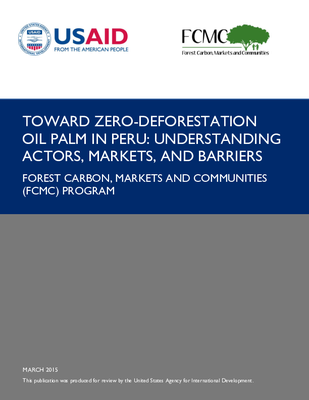Toward Zero-Deforestation Oil Palm in Peru: Understanding Actors, Markets, and Barriers
Large, commercial agriculture and timber enterprises are the principal agents of tropical deforestation in a number of countries, with four key commodities of soy, beef, palm oil, and pulp and paper being key drivers of tropical deforestation globally. TFA 2020 is a public-private partnership with the goal of reducing tropical deforestation associated with these key global commodities. TFA 2020 was born out of discussions between the U.S. Government and the Consumer Goods Forum, a network of more than 400 companies with annual sales exceeding US$3 trillion. Reducing deforestation associated with oil palm will require a change in the production practices of small-, medium-, and large-scale growers, increased demand for sustainably produced products, improved land tenure and governance, and appropriate monitoring and accounting to ensure that greenhouse gas emissions from forests have been reduced. Reducing deforestation from palm oil supply chains will require producers to shift to intensifying production on existing land and/or expanding production to degraded or non-forest land. Changing production practices requires upfront costs to farmers and/or lower returns during the period of transition from the old practice to the new. For example, new cultivars of oil palm can achieve higher yields, but it takes several years for a new plantation to reach full production. For this reason, technical assistance, adequate enabling conditions, and interim financing from loans or grants are often a prerequisite for catalyzing change.
https://biodiversitylinks.org/projects/completed-projects/forest-carbon-markets-and-communities-fcmc-project/resources/toward-zero-deforestation-oil-palm-in-peru-understanding-actors-markets-and-barriers/view
https://biodiversitylinks.org/projects/completed-projects/forest-carbon-markets-and-communities-fcmc-project/resources/toward-zero-deforestation-oil-palm-in-peru-understanding-actors-markets-and-barriers/@@download/image/image.png
File
Toward Zero-Deforestation Oil Palm in Peru: Understanding Actors, Markets, and Barriers
Large, commercial agriculture and timber enterprises are the principal agents of tropical deforestation in a number of countries, with four key commodities of soy, beef, palm oil, and pulp and paper being key drivers of tropical deforestation globally. TFA 2020 is a public-private partnership with the goal of reducing tropical deforestation associated with these key global commodities. TFA 2020 was born out of discussions between the U.S. Government and the Consumer Goods Forum, a network of more than 400 companies with annual sales exceeding US$3 trillion. Reducing deforestation associated with oil palm will require a change in the production practices of small-, medium-, and large-scale growers, increased demand for sustainably produced products, improved land tenure and governance, and appropriate monitoring and accounting to ensure that greenhouse gas emissions from forests have been reduced. Reducing deforestation from palm oil supply chains will require producers to shift to intensifying production on existing land and/or expanding production to degraded or non-forest land. Changing production practices requires upfront costs to farmers and/or lower returns during the period of transition from the old practice to the new. For example, new cultivars of oil palm can achieve higher yields, but it takes several years for a new plantation to reach full production. For this reason, technical assistance, adequate enabling conditions, and interim financing from loans or grants are often a prerequisite for catalyzing change.


